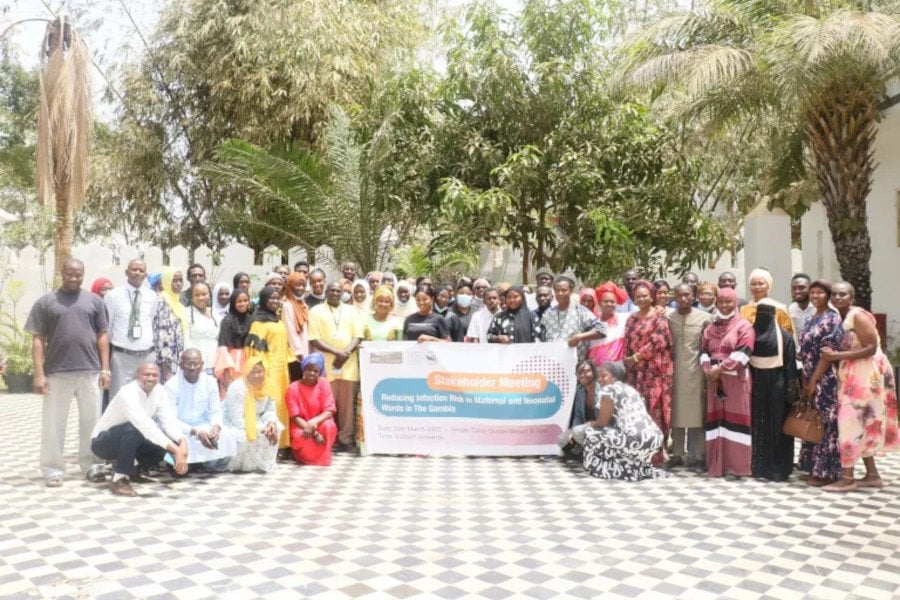
The Medical Research Council Unit The Gambia at the London School of Hygiene & Tropical Medicine (MRCG at LSHTM) held a stakeholder and results dissemination meeting on the impact of cleaning educational interventions on environmental hygiene in neonatal units in The Gambia. The meeting, organised in collaboration with the Ministry of Health (MoH), the Edward Francis Small Teaching Hospital (EFSTH), and Horizons Trust Gambia, was part of activities to close a UKRI-funded study in the Unit, led by Dr Uduak Okomo.
The study was conducted in collaboration with EFSTH between January 2021 to March 2022 and sought to measure environmental contamination in the maternity and neonatal wards before and after a cleaning training intervention.
A total of ninety (90) health care workers comprising nurses, consultants, matrons, and health care officials attended the workshop. Presentations on the study outcome and implications for policy and practice were discussed.
Dr Uduak Okomo, the Principal Investigator of the study said, “The aim of this study was to evaluate the impact of a bespoke training intervention for hospital cleaners and cleaning champions (the nurses, matrons) on the different procedures and steps required in cleaning, and how those trainings will impact environmental cleanliness in the neonatal unit. First, we needed to establish baseline measurements of environmental (surface and equipment) microbiological contamination in the neonatal unit and maternity ward at the EFSTH, and to develop, in collaboration with Horizons Trust, a cleaning training package specifically for the neonatal units. We are grateful to our local stakeholders who contributed to the success of the study. The aim of this workshop is to actively engage with the target audience (cleaners and nurses) and stakeholders in the Edward Francis Small Teaching Hospital and Ministry of Health to discuss our findings and the implications for practice and policy.
The Chief Medical Director of the EFSTH, Prof. Ousman Nyan said, “We are delighted to have participated in this study. The EFSTH will continue to support and host the MRCG at LSHTM to conduct research studies that will help to provide relevant data that will inform health policies and ensure health improvement in the country.”
Also present was Dr Alex Aiken, a Clinical Associate Professor at LSHTM and a practising physician in Infectious Diseases and Medical Microbiology. In his presentation, Dr Aiken, a Co-investigator of the study said, “This subject doesn’t normally gain a lot of attention but cleaning in hospitals is central to the patients’ wellbeing. Reducing the incidence of healthcare-associated infections (HAIs) requires proper environmental cleanliness of frequently touched objects within the hospital environment. HAIs are one of the most relevant public health problems worldwide. Cleaning is critical for reducing these infections.”
The Director of Health Services at the Ministry of Health, Dr Mustapha Bittaye stated that the results of this study will help the Ministry to develop health policies for delivering effective health care services across the country.
He also affirmed the need for more collaboration in research, stating that “These collaborations are important for the Ministry of Health and the training of health care workers by the MRCG at LSHTM has been very helpful. The Ministry has started postgraduate training at the EFSTH and it would be great to improve the level of collaboration in research between the MRCG at LSHTM and the Ministry, not just in governance but in writing grant proposals and implementing research projects together.”
Tina Manjang, the Administrator of Horizons Trust Gambia said, “Our collaboration with the MRCG at LSHTM is natural because they have always been supportive and vice versa. I think what this has allowed us to do as sponsors of the Infection Prevention & Control Program (IPC) which we have widened within the Ministry is to confirm in our minds that our assessment is not complete until we have the science. The data from the research will show us exactly what the problem is. This is what is exciting about this research, and it has helped us to move on and say we will not continue our program without the scientific element”.
Infection is a leading cause of maternal and newborn mortality worldwide. In Sub-Saharan Africa, exposure to unhygienic practices and environment further poses a substantial risk of hospital-acquired infections to mothers and newborns.
Our postgraduate taught courses provide health practitioners, clinicians, policy-makers, scientists and recent graduates with a world-class qualification in public and global health.
If you are coming to LSHTM to study a distance learning programme (PG Cert, PG Dip, MSc or individual modules) starting in 2024, you may be eligible for a 5% discount on your tuition fees.
These fee reduction schemes are available for a limited time only.
